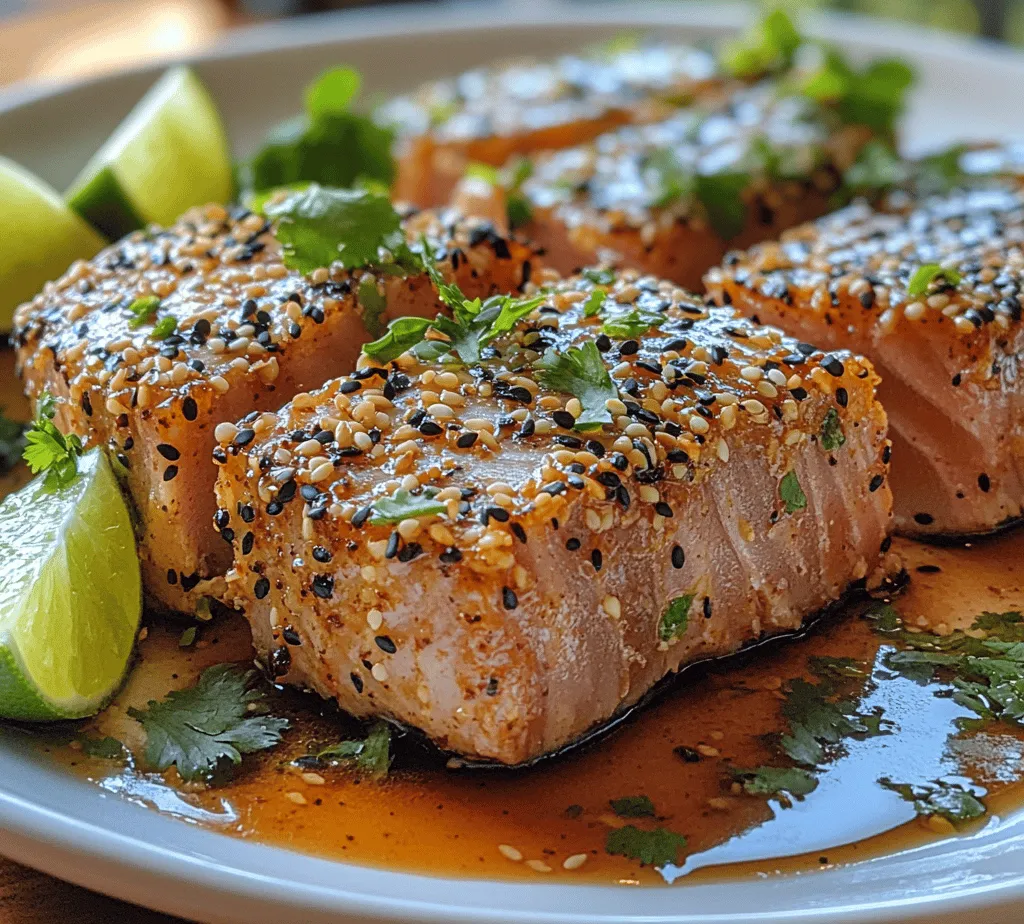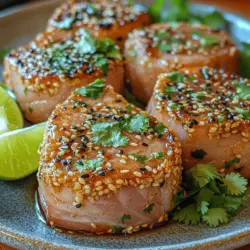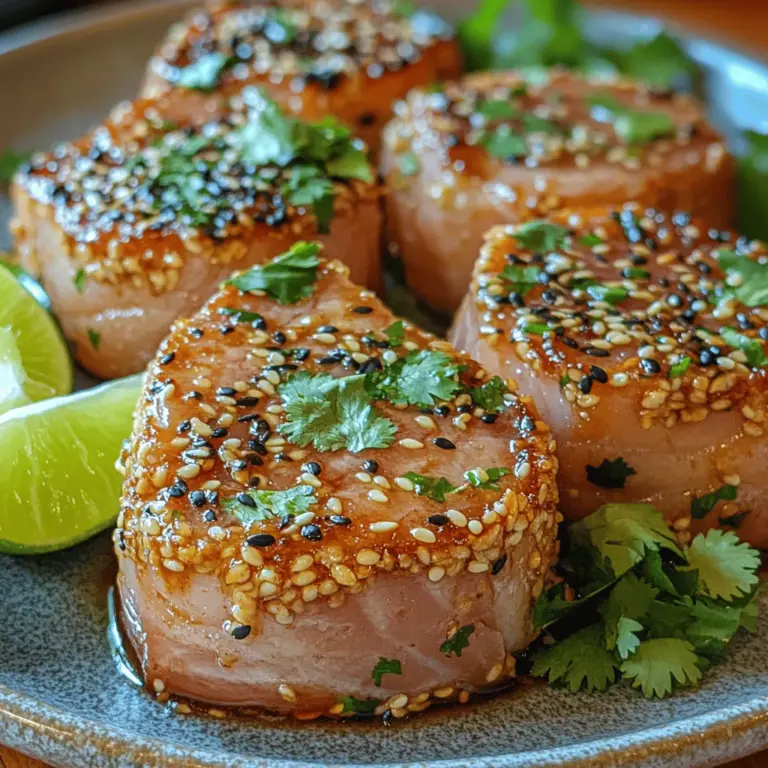Introduction
Ahi tuna, known for its rich flavor and buttery texture, has become a favorite among chefs and home cooks alike. This stunning fish, often served seared or raw, is a staple in many seafood dishes, particularly in Hawaiian and Japanese cuisines. Ahi tuna—more commonly referred to as yellowfin tuna—is celebrated not just for its taste but also for its versatility, lending itself to a variety of cooking techniques and flavor profiles. One such delightful preparation is sesame-crusted ahi tuna, a dish that captures the essence of the ocean while adding a nutty crunch that elevates the entire experience.
The concept of sesame-crusting is simple yet sophisticated. By coating ahi tuna with a mix of black and white sesame seeds, you create a beautiful, textural contrast that enhances the fish’s natural flavors. The toasty aroma of sesame seeds, combined with their earthy taste, complements the delicate sweetness of the tuna, resulting in a dish that is both elegant and satisfying. Whether you’re hosting a dinner party or simply treating yourself to a weeknight meal, this recipe is sure to impress.
Beyond its culinary appeal, ahi tuna is also a powerhouse of nutrition. Packed with high-quality protein and rich in omega-3 fatty acids, it provides heart-healthy benefits while remaining low in calories. Similarly, sesame seeds are tiny nutritional giants, brimming with healthy fats, protein, and antioxidants. The combination of these two ingredients not only creates a delicious dish but also offers a wealth of health benefits.
In this article, we will explore the allure of ahi tuna, delve into the nutritional advantages of sesame seeds, and provide a detailed breakdown of the ingredients needed for this sesame crusted ahi tuna recipe. We will also guide you through the step-by-step cooking instructions, ensuring that you can recreate this elegant dish in your own kitchen.
The Allure of Ahi Tuna
Ahi tuna, scientifically known as Thunnus albacares, is a species of tuna found primarily in warm ocean waters, including the Pacific and Indian Oceans. Renowned for its firm texture and mild flavor, ahi tuna is often enjoyed raw in sushi and sashimi or seared to perfection for a delightful culinary experience. The fish’s vibrant red color and meaty consistency make it visually appealing on any plate, adding a touch of sophistication to your meal.
When it comes to nutritional benefits, ahi tuna stands out as an excellent source of lean protein. A 3-ounce serving of ahi tuna typically contains around 25 grams of protein, making it an ideal choice for those seeking to support muscle health and maintain a balanced diet. Additionally, the fish is rich in omega-3 fatty acids, which are essential for heart health, brain function, and reducing inflammation in the body. These healthy fats play a critical role in promoting overall well-being.
Moreover, ahi tuna is low in calories, making it an ideal option for those looking to manage their weight without sacrificing flavor or satisfaction. Packed with essential vitamins such as B12, selenium, and niacin, this fish not only nourishes the body but also supports metabolic health and boosts energy levels.
As consumers become increasingly conscious of sustainable seafood practices, it’s crucial to source ahi tuna responsibly. Look for certifications such as the Marine Stewardship Council (MSC) label, which indicates that the fish has been caught in a manner that ensures the long-term health of tuna populations and the ecosystems they inhabit. By choosing sustainably sourced ahi tuna, you can enjoy this delectable fish while supporting responsible fishing practices.
Understanding Sesame Seeds
Sesame seeds are tiny, nutrient-dense seeds that have been cultivated for thousands of years across various cultures. Available in both black and white varieties, these seeds are not only a popular ingredient in cooking but also a key component in many traditional dishes around the world. Their versatility allows them to be used in everything from salads and sauces to baked goods and desserts.
Nutritionally, sesame seeds are a treasure trove of health benefits. They are rich in healthy fats, particularly polyunsaturated and monounsaturated fats, which can help lower bad cholesterol levels and support heart health. Additionally, sesame seeds are an excellent source of protein, making them a great addition to vegetarian and vegan diets. The seeds also contain a wealth of vitamins and minerals, including calcium, magnesium, phosphorus, and iron, all of which play essential roles in maintaining overall health.
One of the standout features of sesame seeds is their high antioxidant content. These antioxidants, primarily in the form of lignans, can help protect the body from oxidative stress and inflammation, promoting healthy skin and overall vitality. The potential benefits of sesame seeds extend to cardiovascular health, with studies suggesting that regular consumption may support healthy blood pressure levels and improve cholesterol profiles.
Incorporating sesame seeds into your diet is easy, and they add a delightful crunch and subtle flavor to various dishes. Whether sprinkled on salads, blended into dressings, or toasted and used as a crust for fish, these seeds are a nutritious and flavorful addition to any meal.
Ingredients Breakdown
To prepare sesame crusted ahi tuna, you will need a selection of high-quality ingredients that work harmoniously together to create a delicious dish. Here’s a detailed examination of each ingredient in the recipe:
Ahi Tuna
When selecting ahi tuna, freshness is paramount. Look for bright, deep red fish with a firm texture. Avoid any tuna that appears dull or has a brownish coloration, as this may indicate that it is not fresh. Ideally, purchase ahi tuna from a reputable fishmonger or grocery store that specializes in seafood. If possible, ask about the source of the fish to ensure it is sustainably caught. Fresh ahi tuna can be stored in the refrigerator for up to two days, so plan accordingly.
Black and White Sesame Seeds
The combination of black and white sesame seeds adds both flavor and visual appeal to the dish. Black sesame seeds have a slightly stronger, nuttier flavor compared to their white counterparts, which are milder and more delicate. Together, they create a beautiful contrast on the surface of the tuna, enhancing the dish’s presentation. When purchasing sesame seeds, opt for raw or toasted seeds, depending on your preference. Toasting the seeds before use can amplify their flavor, making them even more aromatic and delicious.
Marinade Components
The marinade for the ahi tuna plays a crucial role in enhancing the fish’s natural flavors. Here are the key components:
– Soy Sauce: This umami-rich ingredient adds depth and saltiness to the marinade. Opt for low-sodium soy sauce if you are watching your salt intake.
– Sesame Oil: A small amount of toasted sesame oil infuses a rich, nutty flavor that complements the sesame crust. Use high-quality sesame oil for the best results.
– Honey: A touch of honey adds a hint of sweetness to balance the savory elements of the marinade. If you prefer a vegan option, you can substitute agave syrup or maple syrup.
– Lime Juice: Freshly squeezed lime juice adds acidity and brightness to the dish, enhancing the overall flavor profile.
– Garlic and Ginger: These aromatic ingredients add depth and warmth to the marinade, creating a well-rounded and flavorful base.
Seasoning
Simple seasoning with salt and pepper is essential for enhancing the flavors of the ahi tuna. Use freshly ground black pepper for the best taste, and be mindful of the amount of salt added, especially if using soy sauce in the marinade.
Suggested Pairings
Sesame crusted ahi tuna can be served with a variety of accompaniments to create a well-rounded meal. Consider pairing it with a refreshing salad, a bed of sushi rice, or steamed vegetables for a complete dining experience. Some popular pairings include:
– Cucumber Salad: A light and crunchy salad dressed with rice vinegar and sesame oil complements the richness of the tuna.
– Sushi Rice: The slightly sweet and vinegared rice provides a perfect base for the tuna, balancing its flavors and textures.
– Grilled Asparagus or Broccoli: Lightly charred vegetables add a hint of smokiness to the dish, contrasting beautifully with the tender fish.
With a clear understanding of the ingredients and their respective roles in the dish, you’re now ready to embark on the cooking process. In the next section, we will delve into the step-by-step instructions for preparing sesame crusted ahi tuna, ensuring that every bite is a delightful experience.

Preparing the Marinade
To elevate the flavors of your Sesame Crusted Ahi Tuna, a well-crafted marinade is essential. The marinade not only infuses the fish with flavor but also helps to tenderize it, enhancing the overall eating experience. A basic marinade for Ahi Tuna typically consists of soy sauce, sesame oil, ginger, garlic, and a splash of citrus—like lime or lemon juice.
Ingredients for the Marinade:
– 1/4 cup soy sauce (or tamari for gluten-free)
– 2 tablespoons sesame oil
– 1 tablespoon fresh ginger, grated
– 1-2 cloves garlic, minced
– Juice of 1 lime
– Optional: A dash of honey or agave for sweetness
Importance of Marinating for Flavor Infusion
Marinating serves two important purposes: flavor infusion and moisture retention. The soy sauce provides salty umami notes, while sesame oil adds a nutty richness, and ginger and garlic contribute a fragrant zest. Allowing the tuna to sit in this mixture not only enhances the dish but also creates a delightful contrast against the crunchy sesame crust.
Marinating the Tuna
Once your marinade is ready, it’s time to marinate the tuna. The best practice is to place the Ahi Tuna steaks in a shallow dish or a resealable plastic bag, then pour the marinade over them. Make sure the tuna is fully submerged in the marinade for even flavor distribution.
Recommended Marination Time and Techniques for Optimal Results
For optimal results, marinate the tuna for at least 30 minutes and up to 1 hour. If you’re short on time, even a 15-minute soak will impart some flavor, but longer marination is preferable for deeper flavor. Be cautious not to marinate for too long (more than 1 hour), as the acidity in the marinade can start to “cook” the fish, leading to a mushy texture.
Creating the Sesame Crust
The sesame crust is what truly makes this dish stand out. It provides a delightful crunch that contrasts beautifully with the tender Ahi Tuna. To create the crust, you’ll need white and black sesame seeds.
Techniques for Achieving a Perfect Crust
1. Coating the Tuna: After marinating, remove the tuna from the marinade and allow excess liquid to drip off. Place a generous amount of sesame seeds on a plate, then press the tuna steaks into the seeds, ensuring they are well-coated on all sides.
2. Mixing Seeds: For a visually appealing and flavorful crust, consider mixing equal parts of white and black sesame seeds. This not only adds aesthetic appeal but also enhances the taste with the nuttiness of both types of seeds.
Pan-Searing Techniques
The key to a successful sesame-crusted Ahi Tuna is pan-searing. This method achieves that sought-after golden crust while keeping the inside tender and rare.
Cooking Times and Methods for Desired Doneness
1. Preheat the Pan: Heat a non-stick skillet or cast-iron pan over medium-high heat. Add a tablespoon of oil (canola, vegetable, or sesame oil) to coat the bottom of the pan.
2. Sear the Tuna: Once the oil is hot but not smoking, carefully place the sesame-crusted tuna steaks in the pan. Sear for about 1-2 minutes on each side for rare (the center should be bright pink). For medium-rare, extend the cooking time to about 2-3 minutes per side.
Tips for Achieving a Golden Crust While Keeping the Inside Tender
– Don’t Overcrowd the Pan: Sear one or two pieces at a time, depending on the size of your pan, to maintain high heat and ensure even cooking.
– Avoid Pressing Down: Resist the urge to press down on the tuna with a spatula; this will release juices and prevent the crust from forming properly.
– Resting: After searing, allow the tuna to rest for a few minutes before slicing. This helps redistribute the juices.
Presentation: Slicing and Serving Suggestions
For an elegant presentation, slice the Ahi Tuna steaks against the grain into thin pieces (about 1/2 inch thick). This method ensures a tender bite. Arrange the slices artfully on a plate, slightly overlapping them for visual appeal.
Importance of Garnishing with Cilantro and Lime
Finish off your dish with a sprinkle of fresh cilantro and wedges of lime on the side. The cilantro adds brightness, while the lime juice enhances the flavors and freshness of the dish. A drizzle of additional sesame oil can also elevate the dish further.
Flavor Profile and Serving Suggestions
The flavor profile of Sesame Crusted Ahi Tuna is a harmonious blend of savory, nutty, and slightly sweet notes. The crispy sesame crust complements the rich, buttery texture of the tuna, creating a truly indulgent experience.
Suggested Sides to Complement the Dish
To round out your meal, consider serving the tuna with:
– Steamed Vegetables: Broccoli, snap peas, or carrots provide vibrant colors and a nutritious balance.
– Rice Options: Jasmine rice or sticky rice pairs perfectly with the flavors of the tuna, soaking up the marinade and juices.
– Fresh Salads: A crisp salad with mixed greens, avocado, and a light vinaigrette can add a refreshing contrast.
Pairing Suggestions: Wine or Beverage Recommendations
For beverage pairings, a chilled Sauvignon Blanc or a light-bodied Pinot Noir complements the richness of the tuna beautifully. If you prefer non-alcoholic options, a sparkling water with lime or a refreshing iced green tea works exceptionally well.
Health Considerations and Dietary Adaptations
Sesame Crusted Ahi Tuna is not only delicious but also packed with health benefits. Ahi Tuna is rich in lean protein, omega-3 fatty acids, and essential vitamins and minerals, making it a smart addition to a balanced diet.
Discussing the Health Aspects of the Dish in the Context of a Balanced Diet
Incorporating Ahi Tuna into your meals can support heart health, improve brain function, and promote overall well-being due to its high omega-3 content. The dish is low in carbohydrates, making it suitable for various dietary preferences.
Potential Dietary Substitutions or Adaptations
– Gluten-Free Considerations for Soy Sauce: To make this dish gluten-free, substitute regular soy sauce with tamari.
– Alternatives for Those with Sesame Allergies: If you or someone you’re serving has a sesame allergy, consider using crushed almonds or panko breadcrumbs mixed with spices as an alternative crust.
Conclusion
In summary, the Sesame Crusted Ahi Tuna recipe stands out for its simplicity and rewarding flavors. The combination of a flavorful marinade, a crunchy sesame crust, and perfectly cooked tuna creates a delightful dish that is both elegant and satisfying.
Don’t hesitate to experiment with variations of this dish. You can try different marinades, crusts, or sides to make it your own. Incorporating Ahi Tuna into your meal rotation not only adds culinary diversity but also supports a healthy lifestyle. Enjoy the process of cooking and the delicious results that come from it!


